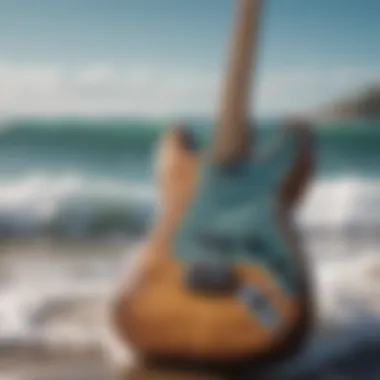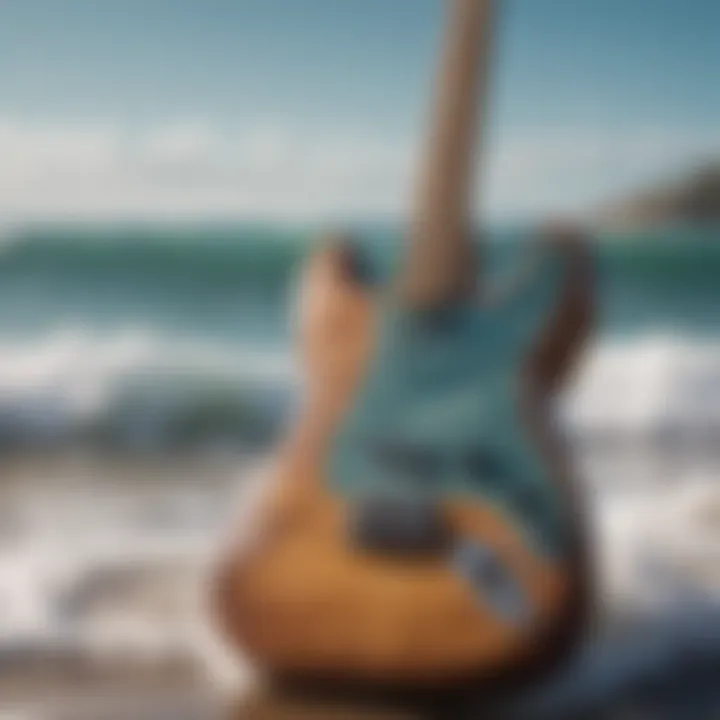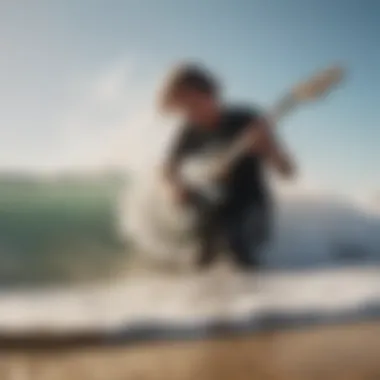The Evolution of Surf Guitar: A Sonic Exploration


Intro
Diving into the world of surf guitar feels like catching the perfect wave. It’s not just about the sound that resonates from the instrument; it’s about the pulse of a culture that rides alongside the tides. Surf guitar blossomed in the early 1960s, a synergy of rock and roll, blues, and the sun-soaked vibes of California. But beyond the catchy melodies, there’s an intricate history woven through its strings. This exploration serves to peel back the layers, revealing how surf guitar evolved, the innovators who shaped its sound, and its enduring influence in music and surf culture.
As we surf through this narrative, we’ll look closely at the gear that defines the surf guitar scene, the techniques that bring it to life, and the connection it holds with the broader world of watersports enthusiasts. So, grab your board and let’s paddle out!
Gear Recommendations
Every surfer knows that without the right gear, catching waves could turn into a nightmare. Surf guitar, much like the sport it symbolizes, requires specific equipment to truly capture its vibrant spirit. Whether you’re just dipping your toes in or ready to ride the bigger waves, having the proper tools can make a world of difference.
Essential Gear for Beginners
For those who are just starting to strum along the surf rock path, you’ll want to consider the following essentials:
- Guitar: A Fender Stratocaster is often viewed as the Holy Grail of surf guitars, but a Fender Jazzmaster will also do wonders with its unique tonal capabilities.
- Amplifier: Look for something like a Fender reverb amp, which is prized for that distinctive warm sound that encapsulates surf music.
- Effects Pedals: A reverb pedal and a delay pedal are must-haves to create that spacious, wave-like sound. Think about brands like Boss or Electro-Harmonix for high-quality options.
Advanced Equipment for Professionals
For the more seasoned players, gear becomes more than just equipment; it’s part of the signature sound they cultivate.
- Guitar Modifications: Consider adding custom pickups or experimenting with different kinds of strings to get the perfect sound.
- Boutique Amplifiers: Brands like Victoria or Two Rock offer amplifiers that deliver a high-end sound, fine-tuned for professionals.
- Advanced Effects: Explore using a surf-specific pedal like the Digitech Surf Distortion for those signature, beachy vibes.
Techniques and Tips
In the realm of surf guitar, technique differentiates the amateurs from the pros. The sound isn’t just in the gear; it’s the way a player interprets the music, capturing the essence of the ocean in every note.
Skill Improvement Strategies
For those looking to sharpen their skills, consider the following:
- Practice Regularly: Just as surfers train to hone their skills, regular practice helps to internalize techniques. Focus on scales, chords, and rhythms often used in surf music.
- Learn from the Legends: Dive into the works of Dick Dale or The Ventures. Analyze their style and try to incorporate some of their techniques into your playing.
- Jam with Others: Playing with fellow musicians can spark creativity and expose you to new techniques.
Safety Practices and Guidelines
While this may seem like an ocean of sound, safety shouldn’t be overlooked:
- If playing at home, keep your gear safe from moisture. Surf guitars are that much sweeter when they are well-maintained.
- Be mindful of your surroundings if playing outside. Just like a surfer watches for waves, musician should keep an eye on their crowd and acoustics.
"Music once spoke to us from the waves, and now it echoes back through our instruments.v"
As we journey through this exploration of surf guitar, we’ll oscillate between its nostalgic roots and its vibrant modern-day waves. From the techniques that propel the sound to the gear that defines it, understanding surf guitar is akin to understanding the rhythmic essence of surfing itself. One isn’t merely about the music; it’s a lifestyle that resonates through both the surf and the strings.
Understanding Surf Guitar
Understanding surf guitar unlocks the gateway to a vibrant musical genre that captures the essence of coastal culture and embodies a laid-back yet electrifying sound. It’s more than just a style of music; it’s an expression deeply rooted in the surf culture of the 1960s. This section provides insights into the origins and characteristics that define surf guitar, making it essential for enthusiasts who seek to grasp its significance.
Origins and Background
Surf guitar emerged as a distinctive genre during the late 1950s and early 1960s, primarily in California. The sound was born from a melange of rock and roll, jazz, and traditional Hawaiian music. Pioneers like Dick Dale, often referred to as the "King of the Surf Guitar," played an indispensable role in shaping its identity. Dale’s innovative techniques, such as rapid alternate picking and reverb usage, created a sonic landscape that echoed the waves of the ocean.
As surfers began to form a community, music quickly became a part of their lifestyle. Tracks like "Misirlou," performed by Dale, fused the thrill of surfing with a bold instrumental flair. The music rallied surfers together and helped cement surf culture in the social fabric of the time. Furthermore, labels like Del-Fi Records aided in promoting surf music nationally, contributing to its spread. Today, surf music is often associated with the carefree spirit of beach life, capturing a nostalgic vibe that resonates with both young and old.
Defining Characteristics
Surf guitar is easily recognizable by its unique sound design and performance style. Here are some defining characteristics:


- Reverb-drenched tones: One of the most prominent features is the heavy use of reverb. This effect simulates the sound of waves crashing and enhances the atmospheric feel of the music.
- Twangy melodies: Guitars often utilize a clean, bright sound with a noticeable twang. This can be achieved through unique picking styles or using specific guitar models, notably Fender Stratocasters.
- Instrumental focus: Though some surf songs feature vocals, many are instrumentals highlighting the guitar’s prowess. This allows for a storytelling approach through sound rather than lyrics.
- Rhythmic drive: The beat is often upbeat, creating an energetic sense of movement that mirrors the rush of surfing.
Key Figures in Surf Guitar History
The realm of surf guitar is not just a collection of catchy melodies and reverberating sounds; it is built upon contributions from certain iconic figures who sculpted its very identity. These musicians were not merely performers; they were innovators and cultural architects who defined and expanded the genre. Understanding who they are offers insight into how surf guitar has evolved and why it continues to resonate with audiences today. Each of these key figures brought a unique approach, blending technical prowess with cultural relevance, setting the stage for future explorations of sound.
Dick Dale: The King of the Surf Guitar
To discuss surf guitar is to start with Dick Dale, a name synonymous with the genre. He is often hailed as the "King of the Surf Guitar" for good reason. His melodic artistry and intense performance style came out of a rich cultural background, incorporating Middle Eastern, Mexican, and rock influences. Delving into his life and work reveals how he embraced the sonic landscape of California’s beaches.
Dale's signature sound emerged through the mastery of his Fender Stratocaster, utilizing rapid fire picking techniques that echoed the waves crashing on the shore. He pushed the boundaries of electric guitar, experimenting with reverb to create that unmistakable surf sound we recognize today. Tracks like "Misirlou" are more than just songs; they're a sensory experience, cutting through the air like a wave.
"Dick Dale didn’t just play guitar; he created a hurricane of sound that could make you feel the surf even when you’re miles away from the ocean."
His live performances were legendary, often featuring explosive events that captivated audiences. Dale's influence stretches beyond just music; his passion for the sport of surfing intertwined with his songs, reflecting a lifestyle that many aspired to. His contributions became deeply entwined with the sport's identity, cementing him as a cultural icon that still inspires musicians and surfers alike.
The Ventures and Their Influence
Following closely in Dale’s wake were The Ventures, a band that carved out their niche in the surf guitar soundscape. Known primarily for their instrumental tracks, The Ventures brought a more polished and radio-friendly approach to surf guitar. Their hits like "Walk, Don’t Run" not only dominated the charts but also set the standard for aspiring guitarists.
The Ventures took surf music and made it accessible to a wider audience, leading to a surge of interest in the genre. They didn’t just play music; they transmitted a vibe, capturing the essence of the California beach culture. Their musical style incorporated catchy hooks and harmony, creating a sound that both surf enthusiasts and mainstream listeners could enjoy.
Dissecting their influence reveals a flashbulb moment in the evolution of surf guitar. While Dick Dale was raw and intense, The Ventures were smooth and catchy—laying down a foundation that would influence countless artists and genres. The band's effect on music can still be felt today, as the surf sound continues to evolve while embracing elements they perfected.
Legacy of Other Notable Guitarists
While Dick Dale and The Ventures might dominate the conversation, there exists a treasure trove of other notable guitarists who contributed meaningfully to surf guitar’s history. Figures like Brian Setzer, known for his work with the Stray Cats, infused rockabilly elements that continued to modernize the surf sound. His energetic performances and exceptional guitar work brought a fresh perspective to the genre, appealing to a new wave of listeners.
Then there's the unique charm of Jon and the Nightriders. Their emphasis on ensuring the classic surf style remains relevant showcases how the genre is very much alive today. They not only held onto the traditions of surf guitar but expanded its reach, incorporating contemporary themes and sounds.
In essence, surf guitar isn’t just a ghost from a bygone era; it’s a living, breathing entity continually shaped by many hands. Each guitarist embellished the canvas in ways only they could, ensuring that the genre remains dynamic. Engaging with their legacies prompts a new appreciation for how far surf guitar has come and its role in shaping the broader musical landscape.
Through understanding these key figures, one can trace the pulse of surf guitar from its inception to its current status, gaining insight into a genre that remains intrinsically linked to the thrill of surfing and beach culture.
Instrument and Technique
Surf guitar is not just a genre; it's a whole package of sound and sensation that has evolved over the decades. The instruments used and the techniques employed by guitarists are integral to achieving that iconic surf sound. The selection of instruments, particularly the guitar, along with the techniques applied help shape a musician's unique expression. Understanding these elements will give readers insight into why surf guitar remains a resonant force in both music and the surf culture.
The Role of the Fender Guitar
When discussing surf guitar, one cannot overlook the Fender guitar, especially models like the Fender Stratocaster and Telecaster. These guitars play a crucial role, as their design allows for a bright and piercing tone that cuts through the mix. The solid body construction, combined with single-coil pickups, gives a clear and sharp sound that’s synonymous with the genre.
The whammy bar also offers musicians the ability to create those classic, swooping pitch effects that echo the rhythmic ebb and flow of the ocean. In many ways, it can be said that the Fender resonates both literally and culturally with surfers and guitarists alike.
"The Fender guitar is to surf music what the wave is to surfing – essential and unmissable."
Amidst the backdrop of the iconic California surf scene, these guitars became symbols of a lifestyle, showcasing the fusion of music and watersports. They weren't merely instruments; they represented freedom and rebellion, a means of expression for a generation captivated by the sea.
Effects Pedals and Sound Manipulation
Then come the effects pedals, which are akin to a magician's bag of tricks for surf guitar players. Reverb, delay, and distortion are staples in creating the lush, cavernous sounds that distinguish surf music.
- Reverb: Creates that spacious, echoing quality resembling the sound of waves crashing.
- Tremolo: Adds a pulsating rhythm that mimics the heartbeat of the ocean.
- Overdrive: Provides a gritty edge that enhances the raw energy of the performance.
For example, a guitarist might use a Fender Reverb unit to delve into deep, shimmering tones that take listeners straight to a sun-soaked beach. The manipulation of sound through these pedals allows for immense creativity within the genre, as players can craft their soundscapes to match the thrill of riding the waves. Welcoming various influences, surfers and musicians have helped shape the sound further, making it an ever-evolving experience.
Picking Techniques Unique to Surf Guitar


The picking techniques used in surf guitar also set it apart from other styles. Players often employ a mix of picking methods, combining fingerpicking with the use of a pick, creating a distinctive, percussive sound. The technique of palm muting, where the palm lightly rests on the strings near the bridge, generates pronounced, staccato notes that echo the choppy waters of the ocean.
Additionally, many surf guitarists lean on the practice of double picking, characterized by rapid alternating strokes. This technique injects energy into solos, making the notes sound brighter and more vibrant, much like sun rays dancing on water.
These techniques require precision and mastery; yet they also provide room for improvisation, encouraging a personal touch. The blending of these styles gives surf guitar its recognizable flavor, striking a chord with audiences both young and old.
The combination of the right instrument, the judicious use of effects, and unique picking techniques creates a multifaceted experience, reinforcing the deep connection between music and the lifestyle it encapsulates. Understanding the intricacies within this approach reveals why surf guitar continues to ride the waves of popularity.
The Cultural Significance of Surf Guitar
Surf guitar transcends mere musical expression; it encapsulates an entire culture and lifestyle that melds exhilarating waves with distinct melodies. This section focuses on how surf guitar not only shaped a musical genre but also wove itself into the very fabric of surf culture, film, and community, creating an enduring legacy.
Association with the Surf Culture
Surf guitar is deeply intertwined with the surf culture that emerged in the 1960s. As surfers carved through the waves, they were often accompanied by the vibrato-laden sounds of their beloved guitar riffs. This connection wasn't just about the music; it was a representation of freedom, youth, and the sun-soaked lifestyle that many aspired to.
The music of Dick Dale, often regarded as the "King of the Surf Guitar," became an anthem for surfers. His fast-paced instrumentals like "Misirlou" captured the thrill of catching the perfect wave. As surfers hit the water, the pulsating beats mirrored the rhythm of the ocean, making it an inseparable part of their adventures.
"For surfers, it's not just about riding the wave; it’s about creating memories that echo through time, much like the notes from a surf guitar."
Similarly, many films showcased surf music as synonymous with beach life. This connection helped popularize the genre, solidifying its place within the broader culture. The aesthetic of surfing—sun, fun, and natural beauty—was enhanced by the evocative sounds of surf guitar, forging an identity that many still celebrate today.
Impact on Film and Media
Surf guitar made significant waves in film and media during and after the 1960s. Movies like "Endless Summer" and "The Beach Boys" documentaries introduced audiences to the allure of surf culture. These films celebrated not just the sport but the exhilarating soundtrack that defined an era.
The inclusion of surf guitar in such films played a pivotal role in cultivating a surf culture that extended beyond California shores, reaching international heights. The rhythmic melodies brought to life the spirit of adventure, friendship, and connection with the ocean.
Moreover, surf music has frequently made its way into modern media, incorporating fresh perspectives that resonate with new generations. From commercials to documentaries, the sweet sounds of surf guitar continue to evoke nostalgia, reminding us of those carefree beach days.
Crafting the Surf Lifestyle
The surf guitar genre has profoundly influenced the surf lifestyle, shaping not just the sound but also the community dynamics. From surf clubs to festivals, the music provides a backdrop for a lifestyle centered around adventure, camaraderie, and respect for nature.
Many surf communities celebrate their passion by organizing events that showcase local talent. Surf competitions often incorporate live music, with bands playing live surf tunes, creating an electric atmosphere that compels participation.
A breath of fresh air, the surf lifestyle, intertwined with the gentle strumming of guitars, invites enthusiasts from all walks to partake in something greater than surfing alone. As individuals bond over shared experiences, the impact of surf guitar knows no bounds, forming connections that last a lifetime.
Modern Interpretations of Surf Guitar
The world of surf guitar, while steeped in rich history, continues to evolve as new artists explore its sound and texture. This section highlights the importance of modern interpretations, revealing how they enrich the musical tapestry and engage contemporary audiences, particularly those linked to the vibrant cultures of watersports and adventure.
Revival of Surf Sound in Contemporary Music
In recent years, the surf sound has been cozying up with the mainstream once again. Bands such as The Bamboos and Allah-Las are striking chords reminiscent of the 60s, attracting both nostalgics and newcomers alike. This revival doesn’t merely mimic the past; it breathes new life into the genre.
The resurgence is also apparent in commercial media. Take a close listen to various ads or TV series featuring surf visuals, and you’ll hear surf-inspired melodies weaving through. These tracks tap into the quintessential vibe of sun, sand, and surf, resonating with both fans of classic surf tracks and emerging acoustics.
"It's like catching a wave; you can never quite replicate the same ride, but every surfer finds unique ways of getting in their groove."
Fusion with Other Genres
Surf guitar isn't playing in a vacuum. Artists today are fusing it with styles like indie rock, punk, and even electronic music. Bands like Tame Impala and The Growlers fuse timeless surf sounds with modern elements, pushing boundaries that once seemed unyielding. This blending of genres introduces surf guitar to wider audiences who might not traditionally gravitate toward instrumental music.
Moreover, there’s a unique beauty to how surf guitar marries with world music influences. The use of exotic scales or rhythms distills a global flavor, turning surf tunes into soulful, cross-cultural celebrations. It's a beautiful symphony that showcases how the past can resonate in fresh and thrilling ways.


Emerging Surf Guitarists to Watch
As the torch passes on, several new guitarists appear poised to become the next beacons of surf music. Notable figures include Dylan Rodger, whose robust riffs blend traditional surf with modern punk aesthetics, and Katy Goodman, who showcases her unique twist on classic surf melodies, influencing a new generation of musicians.
Additionally, many platforms, such as Reddit and Facebook, have become incubators for young talent, allowing aspiring surf guitarists to share their craft and gain feedback. These evolving platforms have fostered communities vibrant with creativity and collaboration affecting the genre's growth.
Finale
In exploring the modern interpretations of surf guitar, we see a blend of respect for tradition and an urge to innovate. This balance is crucial not only for the growth of surf music but also for keeping our connection to the ocean and its resonances strong.
As watersport enthusiasts dive into both the ocean and music, they find surf guitar a soundtrack to their adventures, embodying the spirit of freedom, exploration, and belonging that lies at the heart of surf culture.
Surf Guitar's Connection with Watersports
Surf guitar isn't just about the sonic waves created by the plucking of strings; it's intrinsically tied to the very essence of surfing and the lifestyle that surrounds it. This unique genre conjures up images of sun-kissed shores, rolling waves, and the exhilarating spirit of adventure. The connection between surf guitar and watersports serves as a vibrant backdrop, influencing both the music's character and its cultural significance. Understanding this relationship gives deeper insight into how surf guitar shapes the experience of riding waves and the community that thrives around it.
Soundtracks to Surfing Adventures
Every surfer knows that a great day on the water is often accompanied by the perfect playlist. Surf guitar provides an energizing soundtrack that enhances the excitement of catching waves. From the iconic riffs of Dick Dale to the harmonizing melodies of The Ventures, each note transports surfers to the beach, where waves kiss the sand, and the sun dances on the horizon.
- Driving Riffs: The rapid picking techniques and reverb-drenched sounds bring a sense of motion, echoing the rhythm of the waves.
- Nostalgic Tunes: Many tracks evoke memories of classic surf films, embedding surf guitar in the very fabric of surfing culture.
- Creating Atmosphere: Whether it’s a laid-back afternoon at the beach or an adrenaline-pumping surf competition, the right surf guitar track sets the tone, enhancing the experience immensely.
Surfers often find themselves humming these tunes as they paddle out, illustrating how music becomes part of the ritual itself. A particular track may turn an average session into a legendary memory. The emotional resonance of this connection cannot be overstated.
Community Events and Festivals
Surf culture thrives on community, and surf guitar plays a pivotal role in bringing people together. Events such as surf contests and music festivals often feature surf guitar bands, creating an environment where both athletes and enthusiasts gather to celebrate their shared passions.
- Live Performances: Music festivals like the Surfer’s Journal Fest showcase both established musicians and emerging talents, fostering connections among surf lovers.
- Local Jam Sessions: Community events often transform beaches into mini-concert venues, where guitarists share their riffs and everyone is encouraged to join in the fun.
- Cultural Exchange: These gatherings not only promote surf guitar but also emphasize environmental awareness and respect for nature, reflecting the shared values of both surfers and musicians.
Events like the International Surfing Day exemplify this connection, as surf guitar provides the soundtrack to beach clean-ups, surf clinics, and workshops. The interplay of music and community fosters a sense of belonging that resonates with participants long after the last chord is played.
Surf Guitar and Its Role in Cultivating Passion for Watersports
The passionate energy of surf guitar incites not just enthusiasm for music but also a love for the ocean. More than just a backdrop for surfing, this genre inspires the very activity itself. When listeners hear those familiar, sunny guitar licks, they feel the call of the waves.
- Motivation for Beginners: For those new to surfing, surf guitar can act as a motivational force. It sparks interest and excitement, encouraging individuals to pick up a board and hit the water.
- Strengthening Identity: For seasoned surfers, the music embodies their lifestyle, reinforcing their identity. The marriage between the thrill of surfing and the sound of surf guitar creates a unique synergy that resonates deeply with their adventures.
- Influencing Style: Just as surfers have their own styles on the waves, the surf guitar genre has inspired a plethora of sub-genres, attracting both musicians and surfers who integrate these influences into their own pursuits.
In essence, surf guitar is more than just a musical style; it’s a cultural phenomenon that underscores the joy of riding the waves. Surf culture and surf guitar exist as two sides of the same coin—each defining and amplifying the other, ensuring both remain vital and relevant in our lives.
"Music and surfing share the same waves of exhilaration and freedom, creating an irreplaceable bond between sound and the ocean.”
Coupling the rhythmic sounds with the physicality of watersports nurtures a community of enthusiasts that not only appreciate the music but live it through every ride, wave after wave.
Closure
As we wrap our exploration into the world of surf guitar, it becomes clear that this genre, rooted in coastal culture, has made significant waves over the decades. The enduring legacy of surf guitar serves as a testament to its unique sound and the communities it has fostered. Surf guitar is not merely sound; it's a lifestyle, echoing the rhythm of crashing waves and the thrill of catching the perfect swell.
The Enduring Legacy of Surf Guitar
Surf guitar has left an indelible mark on the music scene. From Dick Dale’s iconic riffs to the harmonious melodies of The Ventures, it captures the essence of carefree days spent by the beach. The jangly tones associated with surf guitar are like a time capsule, transporting listeners to a sun-drenched era where music met the surf.
- Cultural Resonance: Many bands still draw inspiration from the classic surf sound, keeping the spirit alive. Whether it's a cover of a forgotten tune or a fresh take on surf rock, these influences continue to be heard in a variety of genres, blending seamlessly with modern elements. The intricate guitar work, characterized by reverb-heavy tones, evokes images of surfers gliding effortlessly over waves.
- Community and Connection: Numerous local festivals have sprung up, celebrating not just the music but also the culture surrounding surfing. These gatherings bring together enthusiasts, musicians, and fans, reinforcing bonds forged by shared passion. Here, surf guitar serves as the soundtrack to both competition and camaraderie, rallying people under its sunny melodies.
"Surf guitar connects each generation, a bridge from the past to the present, soaking up experiences much like the ocean itself".
Future Prospects for the Genre
Looking ahead, surf guitar may be at a crossroads, merging time-honored traditions with fresh innovations. The revival we're witnessing hints at a vibrant future. Here are several trends poised to shape its development:
- Integration with Electronic Elements: Some modern artists are experimenting by blending surf guitar techniques with electronic music, creating a hybrid genre. This unique fusion opens doors to new audiences while retaining the essence of the original sound.
- Social Media Exposure: Platforms like Reddit and Facebook have given musicians an unprecedented opportunity to showcase their work. This instant access means that rising talents don't just fade into obscurity; they can gain traction and recognition across multiple circles. These forums provide platforms for discussions, collaborations, and up-and-coming bands to thrive.
- Cross-Genre Collaborations: More artists are teaming up across genres. Imagine a surf guitarist working with a reggae drummer or a jazz pianist! Such collaborations could breathe new life into the surf genre, making it relevant for younger music fans.
As surf guitar continues to evolve, it’s clear that its vibrant sound will persist, enriching the landscapes of both music and surf culture. The genre remains a living entity—ever-adapting, yet fundamentally tied to its roots.















